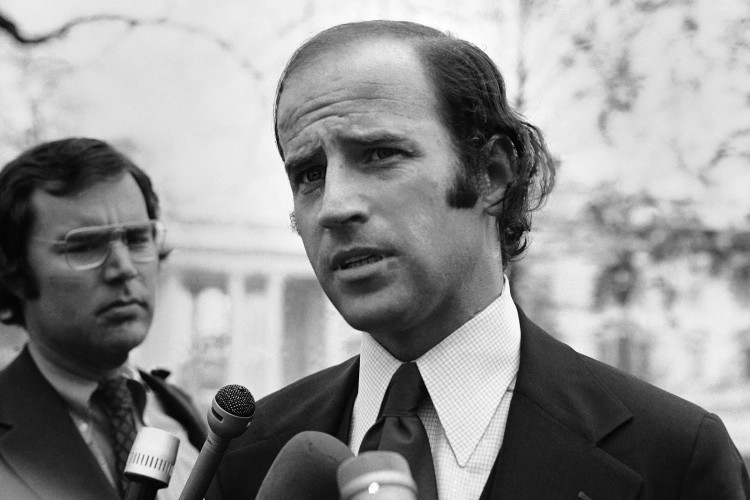
乔•拜登在1972年竞选参议员时,就表现出了对青年赋权和两党合作的热情。图片来源:HENRY GRIFFIN——美联社
偏执抬头,“唯党派论”不断升级,当阴谋论转向对共和党有利,参议员们纷纷选择充耳不闻,佯装沉默——很显然,美国社会已经偏离正轨。随着拜登的上任,“后特朗普时代”的美国能否重归世界中心?拜登的政策会是抚平美国创伤的一剂良药吗?
值得庆幸的是,在社会分裂前所未有的当下,新总统拜登长期信奉的核心信念显得格外优越、可贵。他的价值观涵盖这些关键词:保持彬彬有礼的态度,拥有超越党派的人性本能,在僵局不可避免时萌生解决方案,致力于让下一代发出声音,毕生为青年赋权而努力——面对混乱的社会,这些品质可谓及时雨。
这些拜登长期以来坚持的核心信念,我是怎么知晓的?因为我是见证者——见证了这些价值观指引、定义了他在公共服务生涯刚开始时的努力,见证了它们在接下来的几十年里发芽、成熟。
1972年,我曾在拜登的参议员竞选活动中担任青年志愿者,负责实施青年教育和志愿后勤服务,我坐在前排,观察着拜登的一举一动、行为选择,透过这些观察,我慢慢了解了他的品格。补充一句,我的父亲是前州政党主席亨利•托帕尔,他帮助过年轻时的拜登,助其登上国家政坛。
1970年大选,在我们的家乡特拉华州,多数民主党候选人惨遭落败,当时州民主党内部面临着迫切的变革。亨利•托帕尔任命了一个振兴委员会,来审查和重估全州范围内的民主党,并提出改革建议。这个由25人组成的委员会得到了100名志愿者的帮助,这些志愿者组成了8个工作队,对党内情况进行了为期6个月的研究。
在委员会的25名议员中,27岁的纽卡斯尔县议员拜登也在其中。拜登曾担任政治教育特别工作组主席,曾以公开表达自己的政治信念而出名——他说,政治家的最大责任之一,就是教育、激励和动员年轻人。1971年5月26日,拜登公布了他的调查结果,他得出结论:“我们必须找出对年轻人有重大意义的议题——贫困、种族主义、汇票、污染——我们还要制定立法计划。”
一个月之后,第26条《宪法》修正案的批准给予了18岁公民投票的权利。拜登立即将他的青年赋权理论付诸行动,他亲眼见证特拉华州的青少年群体,让他们亲身感受到自己的声音和选票的力量——青年大军受到了激励,促使1972年拜登在参议院选举中爆了冷门,大获全胜。
作为1972年拜登竞选参议员的一个基本议题,政治教育在特拉华州几乎每一所高中迅速展开。除了介绍参与民主进程的基本知识外,拜登还强调了尊重不同观点的重要性——多年后他在两党和解中达成共识的经历,也佐证了他的这个理念。
我第一次注意到拜登的这个特点,是在拜登走访高中时,他会对毫无政治经验的年轻人提出的问题进行反思。
他教共情,这显而易见;他教激情,充满感染力。他教给我们达成尊敬式和解的基本要求——以倾听的艺术,找到共同立场,在此基础上继续推进。这些技巧,为他赢得了选举。
多年来,他在参议院参与发起的立法议案,体现了他的天赋和跨党派合作的倾向。在两党排名指数上,拜登一生的平均得分在所有入选官员中名列前20%(该指数为衡量议员在参众两院中跨党派工作能力的无党派指标)。在美国两党对立日益严峻的背景下,拜登的努力和成就足以让人惊叹。现在,借助总统的权力,拜登的跨党派愿景终于可以完全实现,这还是历史首次。
无论你是否赞赏拜登,事实是:正是他自己的努力,他对赋予下一代权力的信任,以及他和解和尊重的精神、跨党合作的信念——才能促使两党严重分野的制度得以弥补、修复,结束一场使让美国四分五裂的内战。
2020年总统大选所决定的,绝不只是简单的权力平衡。它让美国朝着文明、和解、包容和两党合作的方向加快脚步前进。
就其努力了一生的政治事业而言,拜登展现出了一种公平和解的本能、对礼貌和尊重的坚持,那是一种无形的、蕴含着美国精神的力量,一次次被打倒,又一次次站起来,成就了今天的拜登。熟悉感、同理心和真实性,这些可贵的特质,都将为他重振美国服务。(财富中文网)
本文作者大卫•托佩尔为《领袖之心,青年拥趸:从1972年参议院选举爆冷门中,拜登学到的一切》
编译:杨二一
偏执抬头,“唯党派论”不断升级,当阴谋论转向对共和党有利,参议员们纷纷选择充耳不闻,佯装沉默——很显然,美国社会已经偏离正轨。随着拜登的上任,“后特朗普时代”的美国能否重归世界中心?拜登的政策会是抚平美国创伤的一剂良药吗?
值得庆幸的是,在社会分裂前所未有的当下,新总统拜登长期信奉的核心信念显得格外优越、可贵。他的价值观涵盖这些关键词:保持彬彬有礼的态度,拥有超越党派的人性本能,在僵局不可避免时萌生解决方案,致力于让下一代发出声音,毕生为青年赋权而努力——面对混乱的社会,这些品质可谓及时雨。
这些拜登长期以来坚持的核心信念,我是怎么知晓的?因为我是见证者——见证了这些价值观指引、定义了他在公共服务生涯刚开始时的努力,见证了它们在接下来的几十年里发芽、成熟。
1972年,我曾在拜登的参议员竞选活动中担任青年志愿者,负责实施青年教育和志愿后勤服务,我坐在前排,观察着拜登的一举一动、行为选择,透过这些观察,我慢慢了解了他的品格。补充一句,我的父亲是前州政党主席亨利•托帕尔,他帮助过年轻时的拜登,助其登上国家政坛。
1970年大选,在我们的家乡特拉华州,多数民主党候选人惨遭落败,当时州民主党内部面临着迫切的变革。亨利•托帕尔任命了一个振兴委员会,来审查和重估全州范围内的民主党,并提出改革建议。这个由25人组成的委员会得到了100名志愿者的帮助,这些志愿者组成了8个工作队,对党内情况进行了为期6个月的研究。
在委员会的25名议员中,27岁的纽卡斯尔县议员拜登也在其中。拜登曾担任政治教育特别工作组主席,曾以公开表达自己的政治信念而出名——他说,政治家的最大责任之一,就是教育、激励和动员年轻人。1971年5月26日,拜登公布了他的调查结果,他得出结论:“我们必须找出对年轻人有重大意义的议题——贫困、种族主义、汇票、污染——我们还要制定立法计划。”
一个月之后,第26条《宪法》修正案的批准给予了18岁公民投票的权利。拜登立即将他的青年赋权理论付诸行动,他亲眼见证特拉华州的青少年群体,让他们亲身感受到自己的声音和选票的力量——青年大军受到了激励,促使1972年拜登在参议院选举中爆了冷门,大获全胜。
作为1972年拜登竞选参议员的一个基本议题,政治教育在特拉华州几乎每一所高中迅速展开。除了介绍参与民主进程的基本知识外,拜登还强调了尊重不同观点的重要性——多年后他在两党和解中达成共识的经历,也佐证了他的这个理念。
我第一次注意到拜登的这个特点,是在拜登走访高中时,他会对毫无政治经验的年轻人提出的问题进行反思。
他教共情,这显而易见;他教激情,充满感染力。他教给我们达成尊敬式和解的基本要求——以倾听的艺术,找到共同立场,在此基础上继续推进。这些技巧,为他赢得了选举。
多年来,他在参议院参与发起的立法议案,体现了他的天赋和跨党派合作的倾向。在两党排名指数上,拜登一生的平均得分在所有入选官员中名列前20%(该指数为衡量议员在参众两院中跨党派工作能力的无党派指标)。在美国两党对立日益严峻的背景下,拜登的努力和成就足以让人惊叹。现在,借助总统的权力,拜登的跨党派愿景终于可以完全实现,这还是历史首次。
无论你是否赞赏拜登,事实是:正是他自己的努力,他对赋予下一代权力的信任,以及他和解和尊重的精神、跨党合作的信念——才能促使两党严重分野的制度得以弥补、修复,结束一场使让美国四分五裂的内战。
2020年总统大选所决定的,绝不只是简单的权力平衡。它让美国朝着文明、和解、包容和两党合作的方向加快脚步前进。
就其努力了一生的政治事业而言,拜登展现出了一种公平和解的本能、对礼貌和尊重的坚持,那是一种无形的、蕴含着美国精神的力量,一次次被打倒,又一次次站起来,成就了今天的拜登。熟悉感、同理心和真实性,这些可贵的特质,都将为他重振美国服务。(财富中文网)
本文作者大卫•托佩尔为《领袖之心,青年拥趸:从1972年参议院选举爆冷门中,拜登学到的一切》
编译:杨二一
With bigotry emboldened, ever-escalating partisanship, and a deafening silence from GOP senators as dangerous conspiracy theories spin to their advantage, America is decidedly off-course. Can Joe Biden navigate a post-Trump America back to center? Will his legacy be that of healer-in-chief?
Fortunately, Joe Biden's long-held core beliefs will fare well in this time of unprecedented division. Ideally suited to calm a climate of anarchy, Biden's values include an insistence on civility; an instinct for reaching across the aisle, often creating solutions at times when impasse seems inevitable; and a belief in giving voice to the next generation, evidenced by a lifetime of dedication to youth empowerment.
How do I know of these long-held core beliefs? I was present when these values guided and defined Biden's earliest steps in public service and observed their maturation through the decades to follow.
As a teenage volunteer charged with the logistics of implementing youth education and volunteerism for the 1972 Biden Senate campaign (and the son of state party chairman, Henry Topel, who helped usher a young Joe Biden onto the national stage), I had a front row seat to observe and engage with the behaviors and choices that continue to define the character of our President-elect.
After the defeat of most of the Democratic candidates in our home state of Delaware in the 1970 election, there was a drastic need for change within Delaware's Democratic Party. Henry Topel appointed a renewal commission to examine and reevaluate the Democratic Party statewide and suggest changes. The 25-member commission was helped by 100 volunteers who served on one or more of eight task forces to conduct a six-month study of the party.
Among the 25 appointed members was Joseph R. Biden Jr., a 27-year-old New Castle County councilman. Biden chaired the political education task force, having already been known for voicing his belief that one of the greatest responsibilities of politicians was to educate, motivate, and activate youth. On May 26, 1971, Biden presented his findings, concluding, "We must identify issues of significant interest to young people—poverty, racism, the draft, pollution—and develop legislative programs. We must integrate youth into the party organization at all levels."
The following month, ratification of the 26th Amendment gave 18-year-olds the right to vote. Biden immediately put his youth empowerment theories into action, personally seeing that Delaware's teenage population learned the power of their voice and their vote—an effort that inspired an army of youth to the most unlikely political upset of its day with Biden's 1972 Senate win.
As a fundamental component of the 1972 Biden Senate campaign, political education unfolded swiftly in nearly every high school in the state. Biden, in addition to presenting the basics of how to participate in the democratic process, also emphasized a respect for competing perspectives—a glimpse into what would later become his practice of reaching across the aisle in bipartisan compromise.
I first observed this trait in Biden’s visits to high schools, where he would reflect on questions raised by soon-to-be first-time voters. He explained precisely why others might hold opposing views. "I hear you, and here's why a 70-year-old retired teacher might feel threatened by that view."
He taught empathy. It was palpable. He taught passion. It was contagious. He taught the essential need for respectful compromise—the art of listening to find common ground on which to move forward. It won him an election.
Through the years, the legislation he cosponsored in the Senate exemplified his gift and inclination for reaching across the aisle. On the Bipartisan Ranking Index, the nonpartisan measure of one's ability to work across party lines in the House and Senate, Biden’s lifetime average score is in the top 20% of elected officials. This is a stunning achievement given the country’s ever-increasing partisanship. And now, with the power of the presidency, Biden’s bipartisan vision could be fully realized for the first time.
Admire Biden or not, it is his process, his trust in empowering the next generation, and his belief in reaching across the aisle in the spirit of compromise and respect that can spark the restoration of a system sorely lacking in bipartisanship and end a civil war that has torn our nation apart.
The 2020 presidential election has determined more than a simple balance of power. It has opened an opportunity to move in the direction of civility, compromise, inclusion, and bipartisanship.
Through a lifetime of service, Joe Biden has shown an instinct for fair-handed compromise; an insistence for civility and respect; and an intangible, wholly American strength forged from being knocked down again and again and always pulling himself up. The result is a level of familiarity, empathy, and authenticity that will serve him well as healer-in-chief.
David Topel is the author of The Heart of a Leader: The '72 Biden Senate Campaign: Lessons from a Youth-Driven Upset.






